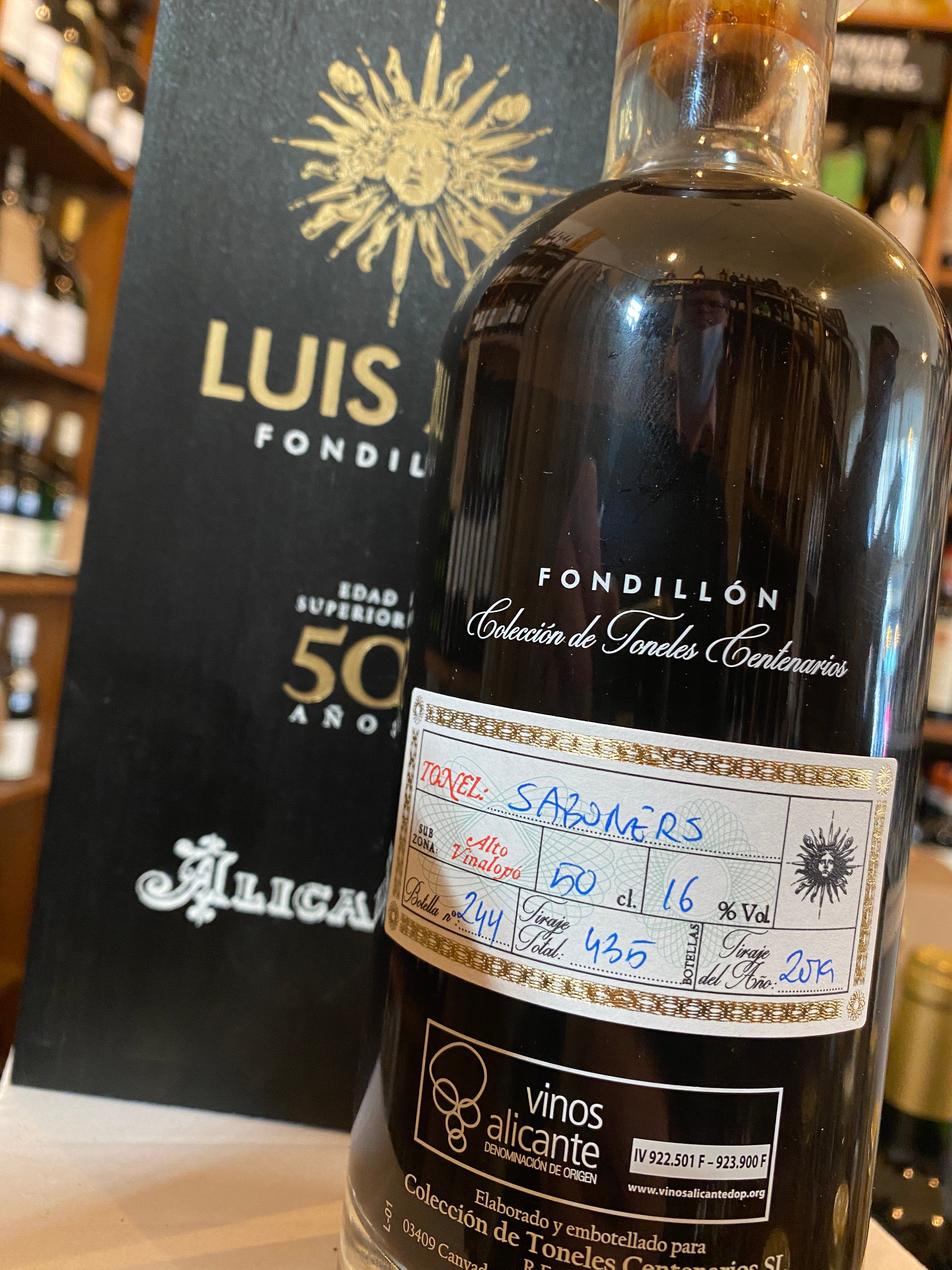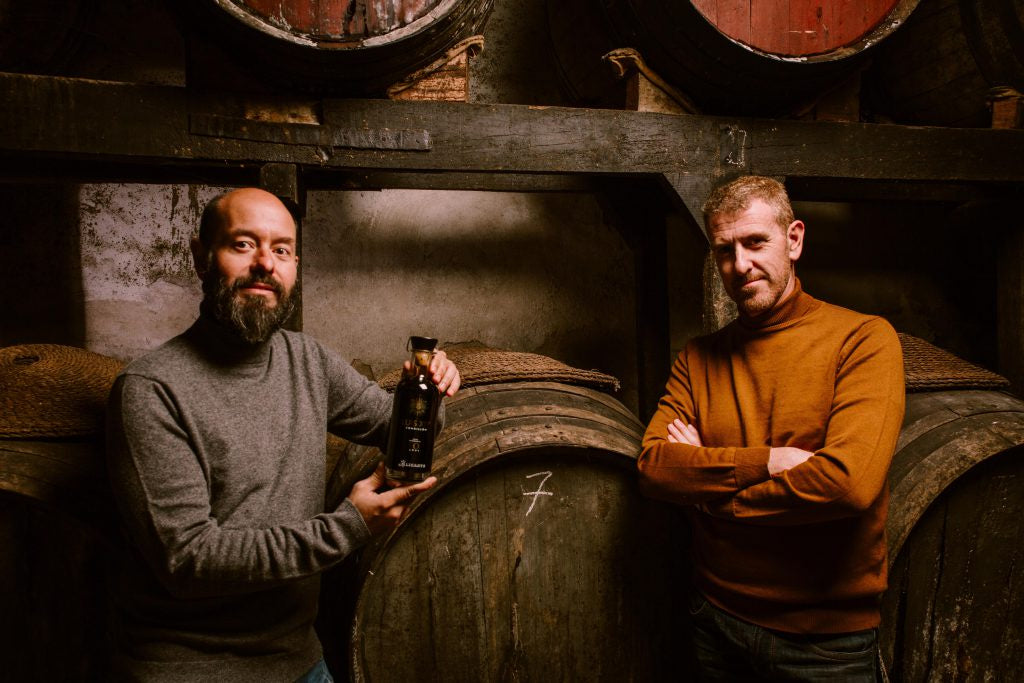Luis XIV 50 Year Old 'Saboners' Barrel Fondillon 50cl
Tasting Note
"Very pruney - toffee, chocolate, intense and dark and haunting. Imagine a Michelin star chef made sticky toffee pudding - that is what this smells like. There is a lift to it, a freshness with ginger spicy notes. The palate has loads of acidity, nudging into Balsamic vinegar flavours with tang, but then there is tobacco and leather and more of that dried fruit - almost fruit jerky! A once in a lifetime experience."
Producer
The 25 year old is a blend of 2 different soleras aged in 19th century American oak. A ‘saca’ was taken from each of the casks 805L 70 cántaros valencianos and 600L pipas and blended. The original casks are topped up individually with another wine at least 25 years old and will not have another saca for another 10 years. A different two will be selected for the next saca and bottling.
David Carbonell, a wine producer in Alicante who had stumbled across an old cellar containing some ancient barrels, mothballed since the 1960s. His story was so compelling, we’ve followed this through and I’d like to introduce you to ‘Luis XIV’ and the mythical Fondillón wines of the Levante.
In 2015, Ferrero Valdés, a contract grape supplier to Vins del Comtat, asked David to visit an old cellar at their winery, to give them some advice. The cellar, which included an old barrel room, had remained undisturbed since the 1960s. They uncovered a wonderful collection of 25 very old, traditional Fondillón ‘toneles’, still with their contents and in surprisingly good condition. It is important to understand that retaining the wine in its original barrel is integral to the tradition of Fondillón winemaking and the natural, constant temperature and humidity of the cellar here, had created ideal conditions to preserve the barrels and the wines they contained. There was very little documentation or information available to help them identify the actual age of the wines.
David and the families worked closely with various experts to ultimately gain classification by the Alicante Consejo Regulador as Fondillón and agree on approved labelling terminology to help denote the age of the wines. Their research included tracing the barrel cooperage markings and using carbon 14 dating on the wood. This has helped to ascertain the approximate manufacture date of the individual barrels and thereby an estimation of the age of the contents contained within. In summary, there are: 10 barrels ‘toneles’ of 800L, from the end of the 19th century. 4 barrels ‘toneles’ of 850L, from the end of the 19th century. 11 barrels ‘pipas’ of 500L, from the beginning of the 20th century.
Another branch of the same wine family, Ballester, also joined the partnership. They have contributed old wines and barrels, as well as more recent vintages from their own cellar to add to the discovery at Ferrero Valdés. Ballester had continued to make and age Fondillón wines over the years, exclusively for family consumption. So, in 2018, David and the two families created Colección de Toneles Centenarios’ (CTC), a partnership with the clear objective to preserve and capitalise on their legacy. For them, the priority was to continue the Fondillón tradition for the future, as part of the heritage of the region. So, what is Fondillón…?
The true nature of Fondillón, requires looking beyond merely the ‘old’ and the ‘rare’. It is produced exclusively from Monastrell (Mourvèdre), the classic red grape grown in the Alicante region. Fondillones have the distinction of great longevity, capable of extended ageing in solera, protected by a naturally higher level of alcohol, achieved through overripening the grapes on the vine and are never fortified. The styles can range from off dry to semi-sweet. They are sometimes identified as ‘rancio’ wines, but the winemaking tradition does not deliberately seek to age the wines oxidatively. A natural element of oxidation does occur, over time, through the very extended ageing and due to evaporation. It is traditional, however, to keep the barrels topped up.
There is also solera style blending with replacement wines but in the same barrel to ensure the handling and exposure to air are more limited. The quality and ageing capacity is reliant on the naturally high alcohol achieved solely from overripe grapes. The single barrel solera is one of the most distinctive factors in creating Fondillón. The same barrel is usually retained for the whole of its lifetime. They are never fully emptied or cleaned and so there is a slow accumulation of lees in the bottom ‘fondo’. This can sometimes be a substantial amount, up to a third, in a very old barrel and is referred to as the ‘madre ancestrale’. The ‘rare’ nature of Fondillón is also due to the limits on quantity that can be extracted from the solera. Only 20-25% will be extracted for bottling at any one time. The solera then needs to be topped up with another aged Fondillón wine. The frequency will also be very limited, with several years between each ‘saca’.
All this contributes to maintaining a very low, annual production. The past Historically, references to ‘Alicante’ wines date back to the 15th century. Alicante’s location on the Mediterranean coast favoured the trading of its ‘robust, sweet wine’ that could withstand the long voyages, without turning to vinegar. There are many historical references to Alicante wine as a favourite of the rich, royals and elite, most famously that of Louis de Rouvroy, Duc de Saint Simon, official chronicler of the court of Louis XIV. He recorded in the ‘Journal de la maladie du Roi’ in 1715, that Louis XIV on his deathbed would only countenance cakes soaked in Fondillón wine. Records show the high value placed on bottles of Fondillón and Alexandre Dumas’s novel The Count of Montecristo describes the Count choosing ‘Alicante wine’ over Port and Sherry.
Today the ‘last bastion’ of Fondillón, originally found all over Alicante, is the Vinalopó region. Only a limited number of producers have continued the tradition commercially and maintained their own soleras, some of which are extremely old. Today there are only 10 wineries certified by the Alicante Consejo Regulador to officially produce Fondillón. David states that Colección de Toneles Centenarios is the only producer to have recently been authorised to bottle and commercialise Fondillón. The last was approved some 15 years ago. Other wineries have requested, but not achieved certification, which is very strict, and no one is anticipating any more wineries to be admitted in the next few years. The Consejo has established procedures to classify wines recovered from old cellars, as well as define the characteristics and assess the quality of wines destined to be blended in soleras and bottled as Fondillón.
The Alicante Consejo Regulador specify that new wines suitable to eventually enter the solera system must be: 100% Monastrell have a minimum of 16% natural alcohol (no fortification) have a minimum of 4 years of aging in old barrels before adding to a solera a maximum of 45g/l residual sugar (no minimum) For a wine to be bottled and labelled as Fondillón it must have a minimum of 10 years ageing in old barrels, although all the wines from the Colección de Toneles Centenarios, plus those used for topping up soleras, well exceed these minimums.
Country: Spain | Region: Alicante | Alcohol: 17% | Grapes: Monastrell




